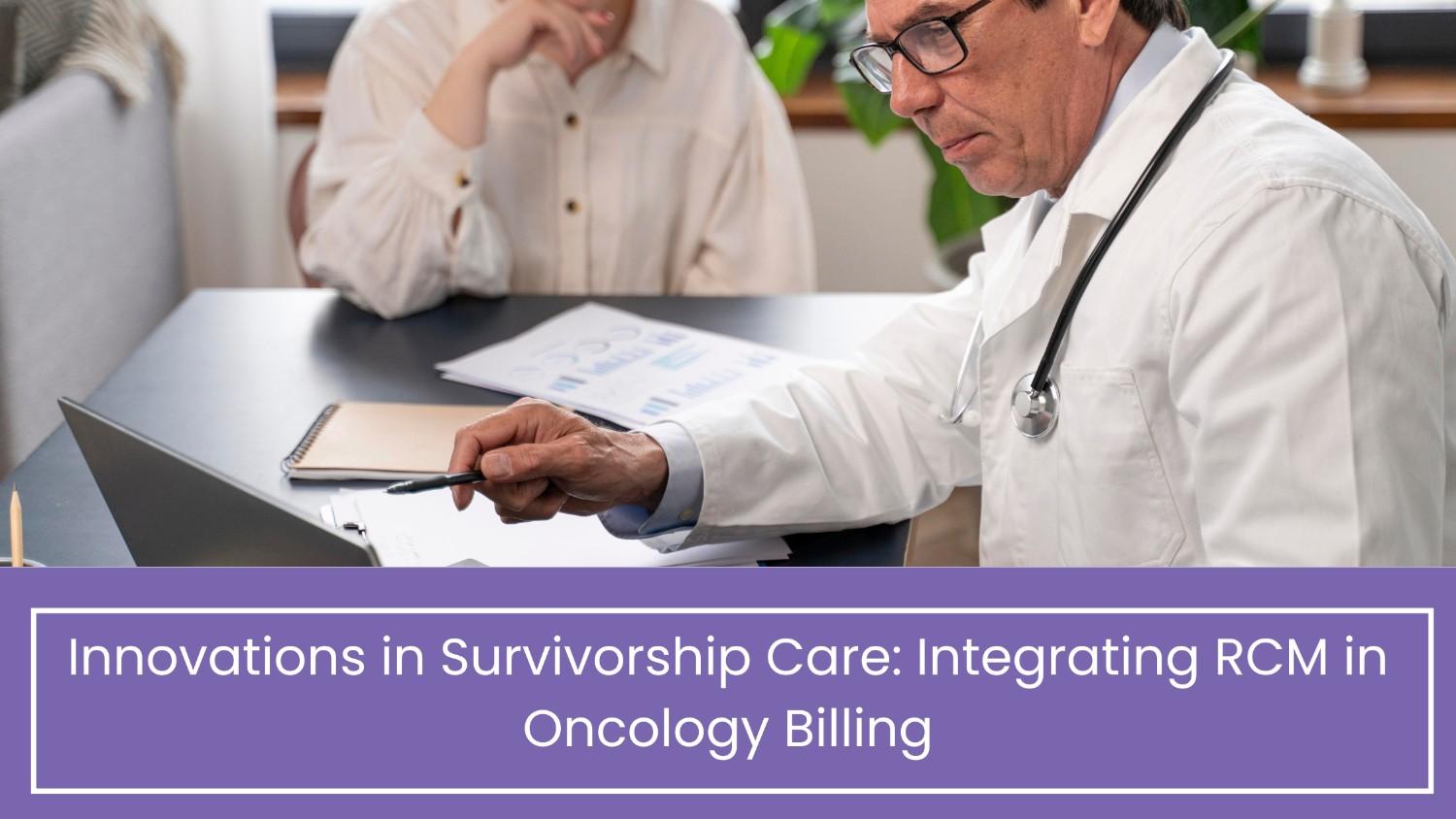Innovations in Survivorship Care Integrating RCM in Oncology Billing
Discover how integrating revenue cycle management (RCM) into oncology billing enhances survivorship care. Improve financial efficiency, streamline claims, and optimize reimbursements. Learn innovative strategies to reduce administrative burdens, support value-based care, and ensure sustainable financial health for oncology practices while prioritizing patient care.
As of 2021, there are over 17 million cancer survivors in the United States. The need for established and extensive survivorship care is pivotal now more than ever. Each survivor’s path to wellness extends beyond the completion of initial treatment, underscoring the importance of continuous care and support. Integrating survivorship planning into value-based oncology practices can profoundly enhance patient outcomes and healthcare efficiency.
However, managing the complexities of survivorship care, such as accurate documentation, billing, and compliance, can be challenging for oncology practices. This is where Practolytics’ Revenue Cycle Management (RCM) services come into play. By offering tailored RCM solutions, Practolytics ensures that oncology practices can focus on delivering exceptional survivorship care while optimizing financial health and operational efficiency.
Table of Contents
Understanding Survivorship Care
Survivorship care offers a coordinated strategy for addressing the long-term health and wellness of cancer survivors. This involves monitoring recurrence, managing chronic health conditions post-treatment, providing psychological support, and promoting healthy lifestyle choices. Survivorship care typically includes a detailed summary of the survivor’s cancer treatment, a schedule for future follow-up visits and screenings, guidelines for managing potential side effects, healthy lifestyle recommendations, and resources for social and economic support.
Recent advancements in cancer treatment have increased the number of cancer survivors, necessitating a structured survivorship model. A successful survivorship care model provides long-term health benefits and timely interventions to mitigate the impact on survivors’ lives. Cancer treatments can have distinct late and long-term effects, such as pain, cognitive issues, recurrence, and fatigue. Therefore, survivorship care is crucial for monitoring these effects and delivering effective management strategies.
Challenges in Survivorship Care
There are significant gaps in ongoing care for cancer survivors. Many survivors experience a lack of coordination between primary care providers and oncology specialists. The shortage of standardized survivorship care programs leads to inconsistent follow-up, resulting in unmet health needs and potential complications.
Innovations in Survivorship Care Models
Personalized Survivorship Models: Tailored care initiatives for cancer survivors consider individual needs and ensure follow-up visits and treatment plans are customized. By incorporating molecular and genetic profiling, healthcare providers can deliver more precise treatments, leading to better patient outcomes and improved quality of life. This personalized approach addresses the physical, emotional, and psychological needs of patients, creating a holistic healthcare environment.
Technology Integration: Advances in technology have transformed follow-up and monitoring in survivorship care. Telehealth enables patients to schedule online appointments with healthcare providers, especially beneficial for those in rural or remote areas. Mobile applications and digital tools continuously developed to enhance patient engagement software, such as medication reminders, educational resources, and symptom tracking, make health management more seamless and keep patients connected with their care team.
Multidisciplinary Collaboration: Successful survivorship care models require the collaboration of healthcare staff, oncologists, specialists, and primary care providers to deliver comprehensive and coordinated services. This multidisciplinary approach ensures all aspects of the survivor’s health are addressed, from continuous cancer surveillance to managing comorbidities and acknowledging psychosocial challenges. Effective communication among various healthcare providers results in a more integrated and supportive healthcare experience.
Integrating Survivorship Care into Value-Based Oncology Practices
Value-based oncology focuses on delivering high-quality, cost-effective, and patient-centered care. Unlike traditional fee-for-service models, value-based care emphasizes outcomes and patient satisfaction, optimizing resources, and reducing unnecessary interventions.
Combining survivorship care with value-based care in oncology offers numerous benefits. It enhances patient outcomes and quality of life by ensuring continuous and comprehensive care. This integration also maximizes cost-effectiveness by reducing hospital readmissions, unnecessary procedures, and tests, and streamlining resource utilization. Focusing on the overall wellness of cancer survivors, value-based care initiatives can create a more sustainable and effective healthcare infrastructure.
Implementing Effective Survivorship Care in Value-Based Models
To effectively integrate survivorship care with value-based oncology practices, several methods can be implemented:
- Comprehensive Care Pathways: Develop detailed care pathways outlining the progression from diagnosis to survivorship.
- Patient-Reported Outcomes: Utilize patient feedback to guide care decisions, ensuring patient preferences are central to care delivery.
- Standardized Survivorship Care: Implement survivorship care as a standard practice across all oncology settings to ensure all survivors receive necessary support.
Successful Models of Survivorship Care Integration
Comprehensive Cancer Centers: MD Anderson Cancer Center provides customized care initiatives, offering psychological and physical support through innovative technology and multidisciplinary teams.
Community-Based Oncology Practices: Cancer Support Community uses local resources and partnerships to provide comprehensive patient care close to home, ensuring ongoing support for survivors.
Lessons Learned:
- Effective survivorship care models emphasize holistic, personalized care, leveraging technology, and multidisciplinary teams.
- Community partnerships and engagement are crucial.
- Key recommendations include adopting a patient-centered approach, investing in technology, and fostering collaborations within healthcare.
Challenges and Solutions
Challenges:
- High treatment costs, medications, and inadequate coverage models impact comprehensive survivorship care.
- Integrating value-based care with survivorship models requires workflow adjustments, additional training, and adopting new technologies, often facing resistance within healthcare settings.
Solutions:
- Advocate for better reimbursement strategies and raise awareness of the importance of survivorship care.
- Utilize partnerships with healthcare providers and communities to improve patient care delivery.
Future Directions
Continuous advancements and innovations in survivorship care models hold the potential for scaling and expansion, promising long-term positive outcomes for cancer survivors.
Conclusion
Integrating survivorship care into value-based oncology and embracing innovations significantly enhances the long-term health and well-being of cancer survivors. These models focus on continuous care to improve patient outcomes and reduce healthcare costs through personalized initiatives. However, the administrative burden of managing survivorship care can be overwhelming for oncology practices. Practolytics’ RCM services provide a comprehensive solution, streamlining billing processes, ensuring compliance, and maximizing reimbursements.
By partnering with Practolytics, oncology practices can achieve seamless operations, improved financial health, and sustainability. Choose Practolytics for robust RCM services that enable your oncology practice to provide optimal survivorship care effortlessly, ensuring that both patients and providers thrive in the evolving healthcare landscape.
ALSO READ – Understanding Oncology Billing: A Comprehensive Introduction
Talk to Medical Billing Expert Today — Get a Free Demo Now!






